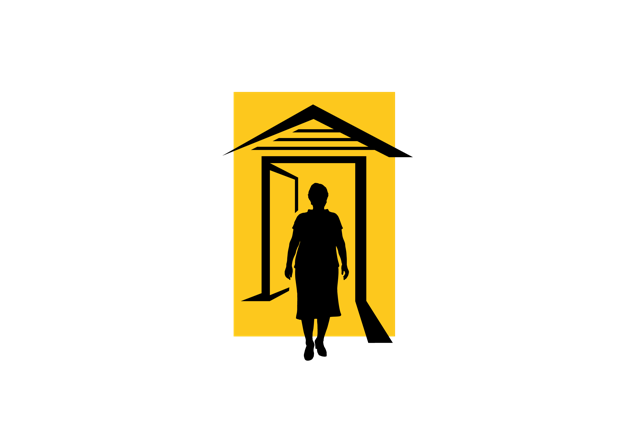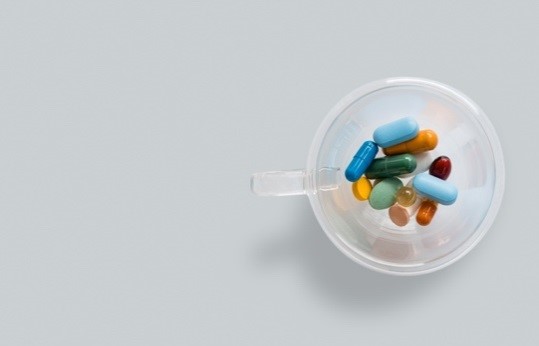Safi S, Sethi NJ, Korang SK, Nielsen EE, Feinberg J, Gluud C, et al. Beta-blockers in patients without heart failure after myocardial infarction. Cochrane Database Systematic Reviews. 2021, Issue 11. Art. No.: CD012565. DOI: 10.1002/14651858.CD012565.pub2.
Picture this…
Sally is 70 and recovering following a heart attack she had 3 months ago. Since the event she has been talking to her doctor to decide what course of treatment is best for her. She wishes to improve her overall health and prevent further serious heart events. Sally has heard that her friend Tim has been taking beta blockers since he had his heart attack. However, Tim has also been diagnosed with heart failure. She wonders whether she should also be taking them.

IMAGE 1: Illustration of an older woman standing outside her front door. Black silhouette image on a yellow background. Indicates Sally’s situation; not only is she recovering from her recent heart attack but also has general concerns regarding her health and predisposition to future cardiac complications.
Image sourced from Centre for Ageing Better.
Summary messages –
- There is low to moderate evidence that beta blockers reduce the risk of death and the likelihood of another heart attack in patients without heart disease who have already experienced a heart attack, when compared with a placebo drug.
- They may also contribute to a reduction in the risk of other major heart events.
- The quality of life for patients after taking beta-blockers is currently unclear.
What the research says –
Cardiovascular disease is the leading cause of death globally, accounting for 15% of all deaths. Beta blockers are a drug used to slow heart rate in patients. They are used to treat many conditions including high blood pressure, heart failure and the physical symptoms of anxiety. They are also commonly used for patients with heart disease following a heart attack in order to decrease the oxygen demand of the heart and reduce chest pain by allowing the heart walls to stretch further. It is, however, not universally agreed whether people without heart failure should be treated with beta blockers after experiencing a heart attack.
This systematic review published in the Cochrane Library aimed to collect data from randomised control trials that assessed the positive and negative effects of beta blocker treatment in patients without heart failure after heart attack compared to a control treatment group (either those receiving a placebo or receiving no intervention).
Outcomes measured included:
- Death due to any cause.
- Serious adverse events. These are defined as “any untoward medical occurrence that at any dose” results in a defined set of outcomes such as a participant requiring hospitalisation or experiencing a life-threatening event.
- Major cardiovascular events (comprising heart-related death or repeated heart attack). Secondary outcomes of the treatment were also measured.
25 trials were included in the review, accounting for 22,423 participants with an average age of 57. All trials were concluded to be at high risk of bias, possibly due to under par trial design and high risk of random error. This reduces the certainty of the evidence and conclusions drawn. Methods for categorising patients as having or not having heart failure were not consistent between trials, leading to further uncertainty in the results.
The conclusions drawn from the data were that beta blockers probably reduced the risk of death and heart attack reoccurrence in those patients that had experienced a heart attack without heart failure. This conclusion was both observed in comparison to placebo-group and to a group receiving no intervention. Researchers concluded beta blockers may also decrease the likelihood of major heart events and heart-related death. The treatment may be associated with at least a 10% reduction in risk ratio for developing these complications. Beta blockers did not, however, decrease the risk of angina (chest pain caused by narrowing of arteries supplying the heart with blood).

IMAGE 2: Image of multiple differently coloured tablets in a glass mug. This represents the form in which beta blockers would be administered (however this would be a single tablet taken at the frequency recommended by your doctor.
Photo by Adam Nieścioruk on Unsplash.
Where is Sally now?
Due to the lack of high quality evidence on this topic, Sally and her doctor decided to not go ahead with beta blocker treatment. They came to this conclusion after weighing up the possible positive effects of the medication in preventing further heart events and the negative side effects that can be associated the treatment such as dizziness, nausea and decreased blood supply to toes and fingers. More research should be performed to increase the amount of evidence on whether these medications contribute to positive health effects and whether they should become more routinely prescribed. Sally continues to recover at home and is focussing her efforts on maintaining a healthy lifestyle in the hopes of preventing further heart events.

IMAGE 3: Image of a female health care professional in discussion with a female patient. Used to represent the conversation Sally will be having with her doctor to decide her next treatment steps.
Photo by National Cancer Institute on Unsplash.
BSc Medical Sciences student
University of Exeter
Reference points –
Safi S, Sethi NJ, Korang SK, Nielsen EE, Feinberg J, Gluud C, et al. Beta-blockers in patients without heart failure after myocardial infarction. Cochrane Database Systematic Reviews. 2021, Issue 11. Art. No.: CD012565. DOI: 10.1002/14651858.CD012565.pub2.
Please note: Stories and pictures used do not represent specific individuals – they are utilised to contextualise the data into a more digestible format.
If you have any comments regarding this blog post, please contact us at globalageing@cochrane.org. We would love to hear your thoughts and answer any questions you may have.
Web editor: Monserrat Conde
